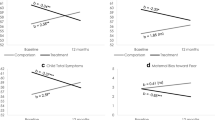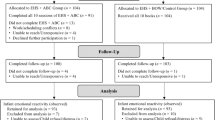Abstract
Cognitive bias modification (CBM) techniques, which experimentally retrain abnormal processing of affective stimuli, are becoming established for various psychiatric disorders. Such techniques have not yet been applied to maternal processing of infant emotion, which is affected by various psychiatric disorders. In a pilot study, mothers of children under 3 years old (n = 32) were recruited and randomly allocated to one of three training exercises, aiming either to increase or decrease their threshold of perceiving distress in a morphed continuum of 15 infant facial images. Differences between pre- and post-training threshold were analysed between and within subjects. Compared to baseline thresholds, the threshold for perceiving infant distress decreased in the lowered threshold group (mean difference −1.7 frames, 95 % confidence intervals (CI) −3.1 to −0.3, p = 0.02), increased in the raised threshold group (1.3 frames, 95 % CI 0.6 to 2.1, p < 0.01) and was unchanged in the control group (0.1 frames, 95 % CI −0.8 to 1.1, p = 0.80). Between-group differences were similarly robust in regression models and were not attenuated by potential confounders. The findings suggest that it is possible to change the threshold at which mothers perceive ambiguous infant faces as distressed, either to increase or decrease sensitivity to distress. This small study was intended to provide proof of concept (i.e. that it is possible to alter a mother’s perception of infant distress). Questions remain as to whether the effects persist beyond the immediate experimental session, have an impact on maternal behaviour and could be used in clinical samples to improve maternal sensitivity and child outcomes.

Similar content being viewed by others
References
Arteche A et al (2011) The effects of postnatal maternal depression and anxiety on the processing of infant faces. J Affect Disord 133:197–203. doi:10.1016/j.jad.2011.04.015
Beck AT, Steer RA, Ball R, Ranieri WF (1996) Comparison of Beck Depression Inventories-IA and -II in psychiatric outpatients. J Pers Assess 67:588. doi:10.1207/s15327752jpa6703_13
Bell SM, Ainswort.Md (1972) Infant crying and maternal responsiveness. Child Dev 43:1171. doi:10.1111/j.1467-8624.1972.tb02075.x
Bernhardt BC, Singer T (2012) The neural basis of empathy. Annu Rev Neurosci 35:1–23. doi:10.1146/annurev-neuro-062111-150536
Bohlin G, Hagekull B, Germer M, Andersson K, Lindberg L (1989) Avoidant and resistant reunion behaviors as predicted by maternal interactive behavior and infant temperament. Infant Behav Dev 12:105–117. doi:10.1016/0163-6383(89)90056-8
Drevets WC (2003) Neuroimaging abnormalities in the amygdala in mood disorders. Ann Ny Acad Sci 985:420–444
Field T (2010) Postpartum depression effects on early interactions, parenting, and safety practices: a review. Infant Behav Dev 33:1–6. doi:10.1016/j.infbeh.2009.10.005
Forman DR OHM, Stuart S, Gorman LL, Larsen KE, & Coy KC (2007) Effective treatment for postpartum depression is not sufficient to improve the developing mother-child relationship. Dev Psychopathol 19:585–602
Hadjikhani N, Joseph RM, Snyder J, Tager-Flusberg H (2006) Anatomical differences in the mirror neuron system and social cognition network in autism. Cereb Cortex 16:1276–1282. doi:10.1093/cercor/bhj069
Hallion LS, Ruscio AM (2011) A meta-analysis of the effect of cognitive bias modification on anxiety and depression. Psychol Bull 137:940–958. doi:10.1037/a0024355
Howard LM, Molyneaux E, Dennis CL, Rochat T, Stein A, Milgrom J (2014a) Non-psychotic mental disorders in the perinatal period. Lancet 384:1775–1788. doi:10.1016/S0140-6736(14)61276-9
Howard LM, Piot P, Stein A (2014b) No health without perinatal mental health. Lancet 384:1723–1724. doi:10.1016/S0140-6736(14)62040-7
Kringelbach ML et al (2008) A specific and rapid neural signature for parental instinct. PLoS One 3, e1664. doi:10.1371/journal.pone.0001664
Laurent HK, Ablow JC (2012) A cry in the dark: depressed mothers show reduced neural activation to their own infant’s cry. Soc. Cogn. Affect. Neurosci. 7, 125–134. doi:10.1093/scan/nsq091
Leerkes EM, Burney RV (2007) The development of parenting efficacy among new mothers and fathers. Infancy 12:45–67
Mathews A, MacLeod C (2005) Cognitive vulnerability to emotional disorders. Annu Rev Clin Psycho 1:167–195. doi:10.1146/annurev.clinpsy.1.102803.143916
Murray L, Cooper PJ (1996) The impact of postpartum depression on child development. Int Rev Psychiatr 8:55–63. doi:10.3109/09540269609037817
Murray L, Cooper PJ, Wilson A, Romaniuk H (2003) Controlled trial of the short- and long-term effect of psychological treatment of post-partum depression: 2. Impact on the mother-child relationship and child outcome. Br J Psychiatry 182:420–427
Pearson RM, Cooper RM, Penton-Voak IS, Lightman SL, Evans J (2010) Depressive symptoms in early pregnancy disrupt attentional processing of infant emotion. Psychol Med 40:621–631. doi:10.1017/s0033291709990961
Pearson RM, Lightman SL, Evans J (2011) Attentional processing of infant emotion during late pregnancy and mother-infant relations after birth. Arch Women Ment Hlth 14:23–31. doi:10.1007/s00737-010-0180-4
Pearson RM, Lightman SL, Evans J (2012) Symptoms of depression during pregnancy are associated with increased systolic blood pressure responses towards infant distress. Arch of women’s mental health 15:95–105. doi:10.1007/s00737-012-0269-z
Pearson RM et al (2013) Maternal depression during pregnancy and the postnatal period: risks and possible mechanisms for offspring depression at age 18 years. JAMA psychiatry 70:1312–1319. doi:10.1001/jamapsychiatry.2013.2163
Penton-Voak IS, Bate H, Lewis G, Munafo MR (2012) Effects of emotion perception training on mood in undergraduate students: randomised controlled trial. Br J Psychiatry 201:71–72. doi:10.1192/bjp.bp.111.107086
Penton-Voak IS, Thomas J, Gage SH, McMurran M, McDonald S, Munafo MR (2013) Increasing recognition of happiness in ambiguous facial expressions reduces anger and aggressive behavior. Psychol Sci 24:688–697. doi:10.1177/0956797612459657
Riordan D, Appleby L, Faragher B (1999) Mother-infant interaction in post-partum women with schizophrenia and affective disorders. Psychol Med 29:991–995
Stein A, Arteche A, Lehtonen A, Craske M, Harvey A, Counsell N, Murray L (2010) Interpretation of infant facial expression in the context of maternal postnatal depression. Infant Behav Dev 33:273–278. doi:10.1016/j.infbeh.2010.03.002
Stein A et al (2014) Effects of perinatal mental disorders on the fetus and child. Lancet 384:1800–1819. doi:10.1016/S0140-6736(14)61277-0
Strathearn L, Fonagy P, Amico J, Montague PR (2009) Adult attachment predicts maternal brain and oxytocin response to infant cues. Neuropsychopharmacol 34:2655–2666. doi:10.1038/Npp.2009.103
Swain JE, Lorberbaum JP, Kose S, Strathearn L (2007) Brain basis of early parent-infant interactions: psychology, physiology, and in vivo functional neuroimaging studies. J Child Psychol Psychiatry 48:262–287. doi:10.1111/j.1469-7610.2007.01731.x
Tiddeman B, Burt M, Perrett D (2001) Prototyping and transforming facial textures for perception research. Ieee Comput Graph 21:42–50. doi:10.1109/38.946630
Wan MW, Salmon MP, Riordan DM, Appleby L, Webb R, Abel KM (2007) What predicts poor mother-infant interaction in schizophrenia? Psychol Med 37:537–546. doi:10.1017/S0033291706009172
Wan MW, Moulton S, Abel KM (2008) A review of mother-child relational interventions and their usefulness for mothers with schizophrenia. Arch Womens Ment Health 11:171–179. doi:10.1007/s00737-008-0010-0
Young AW, Rowland D, Calder AJ, Etcoff NL, Seth A, Perrett DI (1997) Facial expression megamix: tests of dimensional and category accounts of emotion recognition. Cognition 63:271–313. doi:10.1016/S0010-0277(97)00003-6
Acknowledgments
We are grateful to all the mothers who participated in this study, to the mothers and children involved in creating the database of original images and to Professor Alan Stein (University of Oxford) for providing us access to these images from which we derived our composites. We are also grateful for our respective funding sources: RC is a National Institute of Health Research (NIHR) Academic Clinical Fellow in Psychiatry; K.S.B. is funded by the National Institute for Health Research School for Primary Care Research (NIHR SPCR). The NIHR SPCR is a partnership between the Universities of Birmingham, Bristol, Keele, Manchester, Nottingham, Oxford, Southampton and University College London. RP is supported by an Elizabeth Blackwell Institute Post-Doctoral Fellowship funded by Wellcome Trust Institutional Award (097822/Z/11/ZR). The views expressed are those of the author(s) and not necessarily those of the NHS, the NIHR or the Department of Health.
Author information
Authors and Affiliations
Corresponding author
Additional information
Key points
• Maternal mental illness is associated with altered maternal sensitivity to infant distress.
• Altered maternal sensitivity may mediate the association between maternal mental illness and adverse child outcomes.
• Maternal sensitivity does not appear to improve following recovery from mental illness.
• This study shows that cognitive bias modification techniques can alter the threshold for perceiving infant distress, and can be used to both increase and decrease sensitivity to infant distress.
• Such techniques may be a novel way of altering maternal sensitivity to improve maternal-child relationships and child outcomes.
• Potential clinical applications include use in mothers with perinatal depression, schizophrenia and autism, but further research is needed.
Rights and permissions
About this article
Cite this article
Carnegie, R., Shepherd, C., Pearson, R.M. et al. Changing mothers’ perception of infant emotion: a pilot study. Arch Womens Ment Health 19, 167–172 (2016). https://doi.org/10.1007/s00737-015-0565-5
Received:
Accepted:
Published:
Issue Date:
DOI: https://doi.org/10.1007/s00737-015-0565-5




